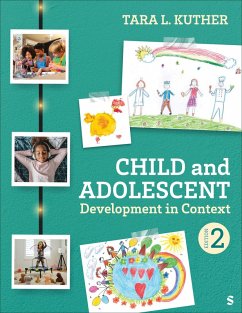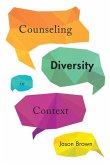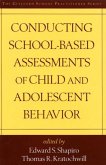Tara L. Kuther
Child and Adolescent Development in Context
Versandkostenfrei innerhalb Deutschlands
183,99 €
inkl. MwSt.
Versandkostenfrei*
Erscheint vorauss. 14. Mai 2026
Melden Sie sich
hier
hier
für den Produktalarm an, um über die Verfügbarkeit des Produkts informiert zu werden.

92 °P sammeln
Tara L. Kuther
Child and Adolescent Development in Context
- Broschiertes Buch
In Child and Adolescent Development in Context, Second Edition award-winning author Tara L. Kuther brings developmental research to life by framing it within real-world contexts, illustrating how internal factors interact with a wide range of social, environmental, and cultural influences.
Andere Kunden interessierten sich auch für
![Psychology in the Work Context Psychology in the Work Context]() Psychology in the Work Context83,99 €
Psychology in the Work Context83,99 €![Shame in Context Shame in Context]() Susan MillerShame in Context61,99 €
Susan MillerShame in Context61,99 €![Counseling Diversity in Context Counseling Diversity in Context]() Jason BrownCounseling Diversity in Context49,99 €
Jason BrownCounseling Diversity in Context49,99 €![Conducting School-Based Assessments of Child and Adolescent Behavior Conducting School-Based Assessments of Child and Adolescent Behavior]() Thomas R. Kratochwill / Edward S. Shapiro (eds.)Conducting School-Based Assessments of Child and Adolescent Behavior45,99 €
Thomas R. Kratochwill / Edward S. Shapiro (eds.)Conducting School-Based Assessments of Child and Adolescent Behavior45,99 €![The Group Context The Group Context]() Sheila ThompsonThe Group Context40,99 €
Sheila ThompsonThe Group Context40,99 €![A Primer of Child and Adolescent Psychiatry A Primer of Child and Adolescent Psychiatry]() Yiming CaiA Primer of Child and Adolescent Psychiatry93,99 €
Yiming CaiA Primer of Child and Adolescent Psychiatry93,99 €![Emotional Literacy for Adolescent Mental Health Emotional Literacy for Adolescent Mental Health]() Patricia SherwoodEmotional Literacy for Adolescent Mental Health38,99 €
Patricia SherwoodEmotional Literacy for Adolescent Mental Health38,99 €-
-
-
In Child and Adolescent Development in Context, Second Edition award-winning author Tara L. Kuther brings developmental research to life by framing it within real-world contexts, illustrating how internal factors interact with a wide range of social, environmental, and cultural influences.
Produktdetails
- Produktdetails
- Verlag: Sage Publications Inc Ebooks
- 2 Revised edition
- Erscheinungstermin: 14. Mai 2026
- Englisch
- Abmessung: 276mm x 212mm
- ISBN-13: 9781071913321
- ISBN-10: 1071913328
- Artikelnr.: 75368540
- Herstellerkennzeichnung
- Libri GmbH
- Europaallee 1
- 36244 Bad Hersfeld
- gpsr@libri.de
- Verlag: Sage Publications Inc Ebooks
- 2 Revised edition
- Erscheinungstermin: 14. Mai 2026
- Englisch
- Abmessung: 276mm x 212mm
- ISBN-13: 9781071913321
- ISBN-10: 1071913328
- Artikelnr.: 75368540
- Herstellerkennzeichnung
- Libri GmbH
- Europaallee 1
- 36244 Bad Hersfeld
- gpsr@libri.de
Tara L. Kuther is professor of psychology at Western Connecticut State University where she has taught courses in child, adolescent, and adult development for 30 years. She earned her PhD in developmental psychology at Fordham University. Dr. Kuther is fellow of the Society for the Teaching of Psychology (APA, Division 2), has served in various capacities in the Society for the Teaching of Psychology and Society for Research on Adolescence, and is the former chair of the Teaching Committee for the Society for Research in Child Development. Her research interests include social cognition and risky activity in adolescence and adulthood. She is the award-winning author of Lifespan Development: Lives in Context, other developmental psychology texts, as well as books to promote student professional development and help them succeed in college and afterward.
Preface
Acknowledgments
About The Author
Chapter 1: Introduction to Child Development: Themes, Theories, and
Research
Understanding Development
Core Concepts in Developmental Science
Classic Theories: Psychoanalytic and Behaviorist Theories
Cognitive Theories
Biological and Systems Theories: Evolutionary Developmental, Bioecological,
and Dynamic Systems Theories
Methods of Collecting Data about Children
Research Designs
Applied Developmental Science, Ethics, and Intersectionality
Apply Your Knowledge
Summary
Key Terms
Chapter 2: Biological and Environmental Foundations of Development
Genetic Foundations of Development
Chromosomal and Genetic Abnormalities
Reproductive Technology and Genetic Counseling
Prenatal Diagnosis
Heredity And Environment Interactions
Apply Your Knowledge
Summary
Key Terms
Chapter 3: The Prenatal Period, Birth, and the Newborn
Prenatal Development
Environmental Influences of Prenatal Development
The Prenatal Environment and Prenatal Care
Childbirth
The Newborn
Apply Your Knowledge
Summary
Key Terms
Chapter 4: Physical Development in Infancy and Toddlerhood
Body Growth and Health in Infancy and Toddlerhood
Threats to Infant and Toddler Health
Brain Development During Infancy and Toddlerhood
Sensory and Perceptual Development
Motor Development
Apply Your Knowledge
Summary
Key Terms
Chapter 5: Cognitive Development in Infancy and Toddlerhood
Piaget's Cognitive-Developmental Theory: Sensorimotor Reasoning
Information Processing Theory
Language Development in Infancy and Toddlerhood
Biological and Contextual Influences on Language Development
Apply Your Knowledge
Summary
Key Terms
Chapter 6: Socioemotional Development in Infancy and Toddlerhood
Emotional Development In Infancy And Toddlerhood
Temperament
Attachment
The Self in Infancy and Toddlerhood
Apply Your Knowledge
Summary
Key Terms
Chapter 7: Physical Development in Early Childhood
Growth and Motor Development
Brain Development
Promoting Health in Early Childhood
Threats to Health and Well-Being
Apply Your Knowledge
Summary
Key Terms
Chapter 8: Cognitive Development in Early Childhood
Piaget's Cognitive-Developmental Theory: Preoperational Reasoning
Vygotsky's Sociocultural Theory
Information Processing in Early Childhood
Language Development in Early Childhood
Moral Development and Behavior in Early Childhood
Early Childhood Education
Apply Your Learning
Summary
Key Terms
Chapter 9: Socioemotional Development in Early Childhood
Emerging Sense Of Self
Emotional Development In Early Childood
Families
Gender Typing And Gender Development
Play And Peer Relationships In Early Childhood
Apply Your Knowledge
Summary
Key Terms
Chapter 10: Physical Development in Middle Childhood
Growth and Motor Development
Brain Development
Health in Middle Childhood
Threats to Health in Middle Childhood
Apply Your Knowledge
Summary
Key Terms
Chapter 11: Cognitive Development in Middle Childhood
Piaget's Cognitive-Developmental Theory: Concrete Operational Reasoning
Information Processing Theory
Intelligence
Moral Reasoning in Middle Childhood
Language Development In Middle Chidhood
Learning and Schooling In Middle Childhood
Apply Your Knowledge
Summary
Key Terms
Chapter 12: Socioemotional Development in Middle Childhood
The Self in Middle Childhood
Gender in Middle Childhood
Peer Relationships in Middle Childhood
Families In Middle Childhood
Risk and Resilience in Middle Childhood
Apply Your Knowledge
Summary
Key Terms
Chapter 13: Physical Development in Adolescence
Puberty
Brain Development in Adolescence
Adolescent Health
Threats to Adolescent Health
Adolescent Sexuality
Apply Your Knowledge
Summary
Key Terms
Chapter 14: Cognitive Development in Adolescence
Cognitive Development
Social Cognition
Moral, Civic, And Religious Development
Schools and Academic Achievement In Adolescence
Post-Secondary Education and Employment
Apply Your Knowledge
Summary
Key Terms
Chapter 15: Socioemotional Development in Adolescence
The Self in Adolescence
Adolescents and Their Parents
Peers
Internalizing and Externalizing Issues
Positive Youth Development
Apply Your Knowledge
Summary
Key Terms
Glossary
References
Acknowledgments
About The Author
Chapter 1: Introduction to Child Development: Themes, Theories, and
Research
Understanding Development
Core Concepts in Developmental Science
Classic Theories: Psychoanalytic and Behaviorist Theories
Cognitive Theories
Biological and Systems Theories: Evolutionary Developmental, Bioecological,
and Dynamic Systems Theories
Methods of Collecting Data about Children
Research Designs
Applied Developmental Science, Ethics, and Intersectionality
Apply Your Knowledge
Summary
Key Terms
Chapter 2: Biological and Environmental Foundations of Development
Genetic Foundations of Development
Chromosomal and Genetic Abnormalities
Reproductive Technology and Genetic Counseling
Prenatal Diagnosis
Heredity And Environment Interactions
Apply Your Knowledge
Summary
Key Terms
Chapter 3: The Prenatal Period, Birth, and the Newborn
Prenatal Development
Environmental Influences of Prenatal Development
The Prenatal Environment and Prenatal Care
Childbirth
The Newborn
Apply Your Knowledge
Summary
Key Terms
Chapter 4: Physical Development in Infancy and Toddlerhood
Body Growth and Health in Infancy and Toddlerhood
Threats to Infant and Toddler Health
Brain Development During Infancy and Toddlerhood
Sensory and Perceptual Development
Motor Development
Apply Your Knowledge
Summary
Key Terms
Chapter 5: Cognitive Development in Infancy and Toddlerhood
Piaget's Cognitive-Developmental Theory: Sensorimotor Reasoning
Information Processing Theory
Language Development in Infancy and Toddlerhood
Biological and Contextual Influences on Language Development
Apply Your Knowledge
Summary
Key Terms
Chapter 6: Socioemotional Development in Infancy and Toddlerhood
Emotional Development In Infancy And Toddlerhood
Temperament
Attachment
The Self in Infancy and Toddlerhood
Apply Your Knowledge
Summary
Key Terms
Chapter 7: Physical Development in Early Childhood
Growth and Motor Development
Brain Development
Promoting Health in Early Childhood
Threats to Health and Well-Being
Apply Your Knowledge
Summary
Key Terms
Chapter 8: Cognitive Development in Early Childhood
Piaget's Cognitive-Developmental Theory: Preoperational Reasoning
Vygotsky's Sociocultural Theory
Information Processing in Early Childhood
Language Development in Early Childhood
Moral Development and Behavior in Early Childhood
Early Childhood Education
Apply Your Learning
Summary
Key Terms
Chapter 9: Socioemotional Development in Early Childhood
Emerging Sense Of Self
Emotional Development In Early Childood
Families
Gender Typing And Gender Development
Play And Peer Relationships In Early Childhood
Apply Your Knowledge
Summary
Key Terms
Chapter 10: Physical Development in Middle Childhood
Growth and Motor Development
Brain Development
Health in Middle Childhood
Threats to Health in Middle Childhood
Apply Your Knowledge
Summary
Key Terms
Chapter 11: Cognitive Development in Middle Childhood
Piaget's Cognitive-Developmental Theory: Concrete Operational Reasoning
Information Processing Theory
Intelligence
Moral Reasoning in Middle Childhood
Language Development In Middle Chidhood
Learning and Schooling In Middle Childhood
Apply Your Knowledge
Summary
Key Terms
Chapter 12: Socioemotional Development in Middle Childhood
The Self in Middle Childhood
Gender in Middle Childhood
Peer Relationships in Middle Childhood
Families In Middle Childhood
Risk and Resilience in Middle Childhood
Apply Your Knowledge
Summary
Key Terms
Chapter 13: Physical Development in Adolescence
Puberty
Brain Development in Adolescence
Adolescent Health
Threats to Adolescent Health
Adolescent Sexuality
Apply Your Knowledge
Summary
Key Terms
Chapter 14: Cognitive Development in Adolescence
Cognitive Development
Social Cognition
Moral, Civic, And Religious Development
Schools and Academic Achievement In Adolescence
Post-Secondary Education and Employment
Apply Your Knowledge
Summary
Key Terms
Chapter 15: Socioemotional Development in Adolescence
The Self in Adolescence
Adolescents and Their Parents
Peers
Internalizing and Externalizing Issues
Positive Youth Development
Apply Your Knowledge
Summary
Key Terms
Glossary
References
Preface
Acknowledgments
About The Author
Chapter 1: Introduction to Child Development: Themes, Theories, and
Research
Understanding Development
Core Concepts in Developmental Science
Classic Theories: Psychoanalytic and Behaviorist Theories
Cognitive Theories
Biological and Systems Theories: Evolutionary Developmental, Bioecological,
and Dynamic Systems Theories
Methods of Collecting Data about Children
Research Designs
Applied Developmental Science, Ethics, and Intersectionality
Apply Your Knowledge
Summary
Key Terms
Chapter 2: Biological and Environmental Foundations of Development
Genetic Foundations of Development
Chromosomal and Genetic Abnormalities
Reproductive Technology and Genetic Counseling
Prenatal Diagnosis
Heredity And Environment Interactions
Apply Your Knowledge
Summary
Key Terms
Chapter 3: The Prenatal Period, Birth, and the Newborn
Prenatal Development
Environmental Influences of Prenatal Development
The Prenatal Environment and Prenatal Care
Childbirth
The Newborn
Apply Your Knowledge
Summary
Key Terms
Chapter 4: Physical Development in Infancy and Toddlerhood
Body Growth and Health in Infancy and Toddlerhood
Threats to Infant and Toddler Health
Brain Development During Infancy and Toddlerhood
Sensory and Perceptual Development
Motor Development
Apply Your Knowledge
Summary
Key Terms
Chapter 5: Cognitive Development in Infancy and Toddlerhood
Piaget's Cognitive-Developmental Theory: Sensorimotor Reasoning
Information Processing Theory
Language Development in Infancy and Toddlerhood
Biological and Contextual Influences on Language Development
Apply Your Knowledge
Summary
Key Terms
Chapter 6: Socioemotional Development in Infancy and Toddlerhood
Emotional Development In Infancy And Toddlerhood
Temperament
Attachment
The Self in Infancy and Toddlerhood
Apply Your Knowledge
Summary
Key Terms
Chapter 7: Physical Development in Early Childhood
Growth and Motor Development
Brain Development
Promoting Health in Early Childhood
Threats to Health and Well-Being
Apply Your Knowledge
Summary
Key Terms
Chapter 8: Cognitive Development in Early Childhood
Piaget's Cognitive-Developmental Theory: Preoperational Reasoning
Vygotsky's Sociocultural Theory
Information Processing in Early Childhood
Language Development in Early Childhood
Moral Development and Behavior in Early Childhood
Early Childhood Education
Apply Your Learning
Summary
Key Terms
Chapter 9: Socioemotional Development in Early Childhood
Emerging Sense Of Self
Emotional Development In Early Childood
Families
Gender Typing And Gender Development
Play And Peer Relationships In Early Childhood
Apply Your Knowledge
Summary
Key Terms
Chapter 10: Physical Development in Middle Childhood
Growth and Motor Development
Brain Development
Health in Middle Childhood
Threats to Health in Middle Childhood
Apply Your Knowledge
Summary
Key Terms
Chapter 11: Cognitive Development in Middle Childhood
Piaget's Cognitive-Developmental Theory: Concrete Operational Reasoning
Information Processing Theory
Intelligence
Moral Reasoning in Middle Childhood
Language Development In Middle Chidhood
Learning and Schooling In Middle Childhood
Apply Your Knowledge
Summary
Key Terms
Chapter 12: Socioemotional Development in Middle Childhood
The Self in Middle Childhood
Gender in Middle Childhood
Peer Relationships in Middle Childhood
Families In Middle Childhood
Risk and Resilience in Middle Childhood
Apply Your Knowledge
Summary
Key Terms
Chapter 13: Physical Development in Adolescence
Puberty
Brain Development in Adolescence
Adolescent Health
Threats to Adolescent Health
Adolescent Sexuality
Apply Your Knowledge
Summary
Key Terms
Chapter 14: Cognitive Development in Adolescence
Cognitive Development
Social Cognition
Moral, Civic, And Religious Development
Schools and Academic Achievement In Adolescence
Post-Secondary Education and Employment
Apply Your Knowledge
Summary
Key Terms
Chapter 15: Socioemotional Development in Adolescence
The Self in Adolescence
Adolescents and Their Parents
Peers
Internalizing and Externalizing Issues
Positive Youth Development
Apply Your Knowledge
Summary
Key Terms
Glossary
References
Acknowledgments
About The Author
Chapter 1: Introduction to Child Development: Themes, Theories, and
Research
Understanding Development
Core Concepts in Developmental Science
Classic Theories: Psychoanalytic and Behaviorist Theories
Cognitive Theories
Biological and Systems Theories: Evolutionary Developmental, Bioecological,
and Dynamic Systems Theories
Methods of Collecting Data about Children
Research Designs
Applied Developmental Science, Ethics, and Intersectionality
Apply Your Knowledge
Summary
Key Terms
Chapter 2: Biological and Environmental Foundations of Development
Genetic Foundations of Development
Chromosomal and Genetic Abnormalities
Reproductive Technology and Genetic Counseling
Prenatal Diagnosis
Heredity And Environment Interactions
Apply Your Knowledge
Summary
Key Terms
Chapter 3: The Prenatal Period, Birth, and the Newborn
Prenatal Development
Environmental Influences of Prenatal Development
The Prenatal Environment and Prenatal Care
Childbirth
The Newborn
Apply Your Knowledge
Summary
Key Terms
Chapter 4: Physical Development in Infancy and Toddlerhood
Body Growth and Health in Infancy and Toddlerhood
Threats to Infant and Toddler Health
Brain Development During Infancy and Toddlerhood
Sensory and Perceptual Development
Motor Development
Apply Your Knowledge
Summary
Key Terms
Chapter 5: Cognitive Development in Infancy and Toddlerhood
Piaget's Cognitive-Developmental Theory: Sensorimotor Reasoning
Information Processing Theory
Language Development in Infancy and Toddlerhood
Biological and Contextual Influences on Language Development
Apply Your Knowledge
Summary
Key Terms
Chapter 6: Socioemotional Development in Infancy and Toddlerhood
Emotional Development In Infancy And Toddlerhood
Temperament
Attachment
The Self in Infancy and Toddlerhood
Apply Your Knowledge
Summary
Key Terms
Chapter 7: Physical Development in Early Childhood
Growth and Motor Development
Brain Development
Promoting Health in Early Childhood
Threats to Health and Well-Being
Apply Your Knowledge
Summary
Key Terms
Chapter 8: Cognitive Development in Early Childhood
Piaget's Cognitive-Developmental Theory: Preoperational Reasoning
Vygotsky's Sociocultural Theory
Information Processing in Early Childhood
Language Development in Early Childhood
Moral Development and Behavior in Early Childhood
Early Childhood Education
Apply Your Learning
Summary
Key Terms
Chapter 9: Socioemotional Development in Early Childhood
Emerging Sense Of Self
Emotional Development In Early Childood
Families
Gender Typing And Gender Development
Play And Peer Relationships In Early Childhood
Apply Your Knowledge
Summary
Key Terms
Chapter 10: Physical Development in Middle Childhood
Growth and Motor Development
Brain Development
Health in Middle Childhood
Threats to Health in Middle Childhood
Apply Your Knowledge
Summary
Key Terms
Chapter 11: Cognitive Development in Middle Childhood
Piaget's Cognitive-Developmental Theory: Concrete Operational Reasoning
Information Processing Theory
Intelligence
Moral Reasoning in Middle Childhood
Language Development In Middle Chidhood
Learning and Schooling In Middle Childhood
Apply Your Knowledge
Summary
Key Terms
Chapter 12: Socioemotional Development in Middle Childhood
The Self in Middle Childhood
Gender in Middle Childhood
Peer Relationships in Middle Childhood
Families In Middle Childhood
Risk and Resilience in Middle Childhood
Apply Your Knowledge
Summary
Key Terms
Chapter 13: Physical Development in Adolescence
Puberty
Brain Development in Adolescence
Adolescent Health
Threats to Adolescent Health
Adolescent Sexuality
Apply Your Knowledge
Summary
Key Terms
Chapter 14: Cognitive Development in Adolescence
Cognitive Development
Social Cognition
Moral, Civic, And Religious Development
Schools and Academic Achievement In Adolescence
Post-Secondary Education and Employment
Apply Your Knowledge
Summary
Key Terms
Chapter 15: Socioemotional Development in Adolescence
The Self in Adolescence
Adolescents and Their Parents
Peers
Internalizing and Externalizing Issues
Positive Youth Development
Apply Your Knowledge
Summary
Key Terms
Glossary
References







